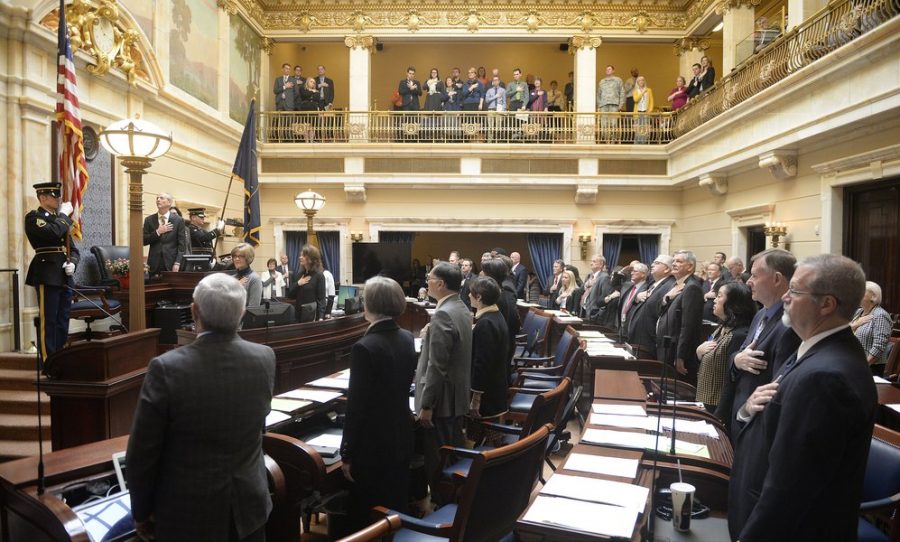Utah legislature passes prop 2 comprise bill
On November 6th, the people of utah voted. The most controversial part of said election was proposition 2. Its goal is to legalize medical marijuana for those with qualifying conditions. People can receive a card with a recommendation from a physician. Under the measure, a medical marijuana cardholder could not smoke marijuana or use a device to facilitate the smoking of marijuana. During any one 14-day period, an individual would be allowed to buy either 2 ounces of unprocessed marijuana or an amount of marijuana product with no more than 10 grams of tetrahydrocannabinol (THC) or cannabidiol. After January 1, 2021, individuals with medical cards would be allowed to grow six marijuana plants for personal use within their homes if there are no dispensaries within 100 miles of their residence.
Many people and organization had strong feelings about the proposition. Organizations like TRUCE utah and the utah patients coalition stood in firm support of the proposition. While organizations like the LDS church and the utah medical association proudly stood in opposition of the proposition. The debate over the proposition tore utahns apart for months until the election came. On november 6th, prop 2 passed. 52.75% of utahns voted yes and 47.25% voted no. The utah legislature was not happy.
The legislation designed to replace Proposition 2, known as the Utah Medical Cannabis Act or House Bill 3001 was passed and the governor signed the bill on December 3, 2018. Negotiations between Utah legislators and Proposition 2 supporters and opponents resulted in an agreement concerning legislative alterations to Proposition 2 to be addressed by the legislature after the November election if the measure was approved, which it was. The alterations were initially presented and referred to as a “compromise deal.” . Governor Gary Herbert called for a special session of the Legislature to convene after the November election to create a medical marijuana policy for Utah regardless of whether or not Proposition 2 was approved by voters. Herbert said, “Whether it passes or fails, we’re going to arrive at the same point and conclusion, which is going to be (of) benefit to the people of Utah. House Bill 3001 made a number of changes to the original measure passed by voters. Among others, HB 3001: Removed the provision allowing patients to grow their own marijuana; Reduced the number of dispensaries allowed; and Required dispensaries to employ pharmacists to recommend dosages HB 3001 kept many of the same qualifying conditions provided for under Proposition 2, but also made some changes, including limiting the list of qualifying conditions to specific illnesses. The bill allows for medical marijuana treatment for HIV or AIDs but not other autoimmune disorders. The bill allows for medical marijuana treatment for cachexia, but not other conditions manifest by physical wasting. It allows marijuana treatment for Crohn’s disease, but not similar gastrointestinal disorders. HB 3001 added conditions that qualify for medical marijuana treatment, including: Terminal illness for those projected to have less than six months left to live; and A condition resulting in a patient receiving hospice care.
And just like the proposition itself, this bill is dividing utahns once again. Supporters like Governor Herbert have said “This is a historic day. With the passage of the Utah Medical Cannabis Act, Utah now has the best-designed medical cannabis program in the country. Working with trained medical professionals, qualified patients in Utah will be able to receive quality-controlled cannabis products from a licensed pharmacist in medical dosage form. And this will be done in a way that prevents diversion of product into a black market.”. And detractors such as Former Salt Lake City mayor and attorney Rocky Anderson said he was considering legal action regarding the legislature’s move to replace Proposition 2 with the Utah Medical Cannabis Act. Anderson wrote, “Although initiative statutes may be amended or repealed by the Legislature, the almost immediate extreme undermining of numerous provisions of Proposition 2 at the behest of The Church of Jesus Christ is anti-democratic and contemptuous of the … recognition in the Utah Constitution that the people are to have the power to enact legislative changes.”
After about two hours of debate on the House floor, the bill was approved by a 60-13 vote. only one Republican, Michael Kennedy of Alpine, voted in opposition of the bill, while every Democrat present voted against it. After more than 90 minutes of consideration on the Senate floor, the bill sailed through with a 22 to 4 vote. Gene Davis, D-Salt Lake City, expressed some concerns with the compromise but voted for it. Besides him, all Democrats present opposed the bill while Republicans broke uniformly in favor of the bill.
The question that arises from this ordeal is does the utah state legislature have the right to overturn a proposition? Together for Responsible Use and Cannabis Education (TRUCE) and the Epilepsy Association of Utah (EAU) and), comment by saying that the act violates the state constitution’s provision for ballot initiatives, by disregarding the cannabis plan approved by voters, as well as
“the unconstitutional domination of the State, and interference with the State’s functions, by The Church of Jesus Christ of Latter-day Saints.”
The state of utah is going to be sued by some of the pro prop two organizations. The attorney and former Salt Lake City mayor Rocky Anderson filed the complaint late Wednesday and seeks to overturn the Utah Medical Cannabis Act. many people are furious about the LDS church’s involvement in the proposition. Some also accuse the legislature of collusion with the church. We will have to see how.
























